Shopify Marketing Strategies: Hotlist to Boost Your Sales

Do you feel like your Shopify sales need a little boost?
Marketing your Shopify store better is often the key to driving traffic, boosting sales, and maximizing your return on investment. Yet, many Shopify store owners are often clueless about the proper way to market their Shopify store.
It’s no secret that Shopify is one of the top e-commerce platforms in the market, powering millions of businesses across the globe. Once you’ve set up your Shopify store, it’s time to market it to reach new customers.
Whether you are a seasoned pro or you are just starting, this post will let you learn about some powerful marketing strategies and tools. With them, you can increase traffic to your Shopify store, grow sales, and take your business to the next level.
So, are you ready to dive in? Let’s do it!

What is Shopify Marketing
Shopify marketing involves using digital marketing and promotional strategies to drive people to your website and convert them into customers. It aims to increase customer engagement, build brand awareness, retain existing customers, and improve customer loyalty through different online marketing channels.
In the most simple sense, Shopify marketing is all about finding your customers wherever they are online, driving this traffic to your site, and convincing them to make a purchase. An effective Shopify marketing strategy involves all aspects of marketing, including market research, product development, branding, advertising, and more.
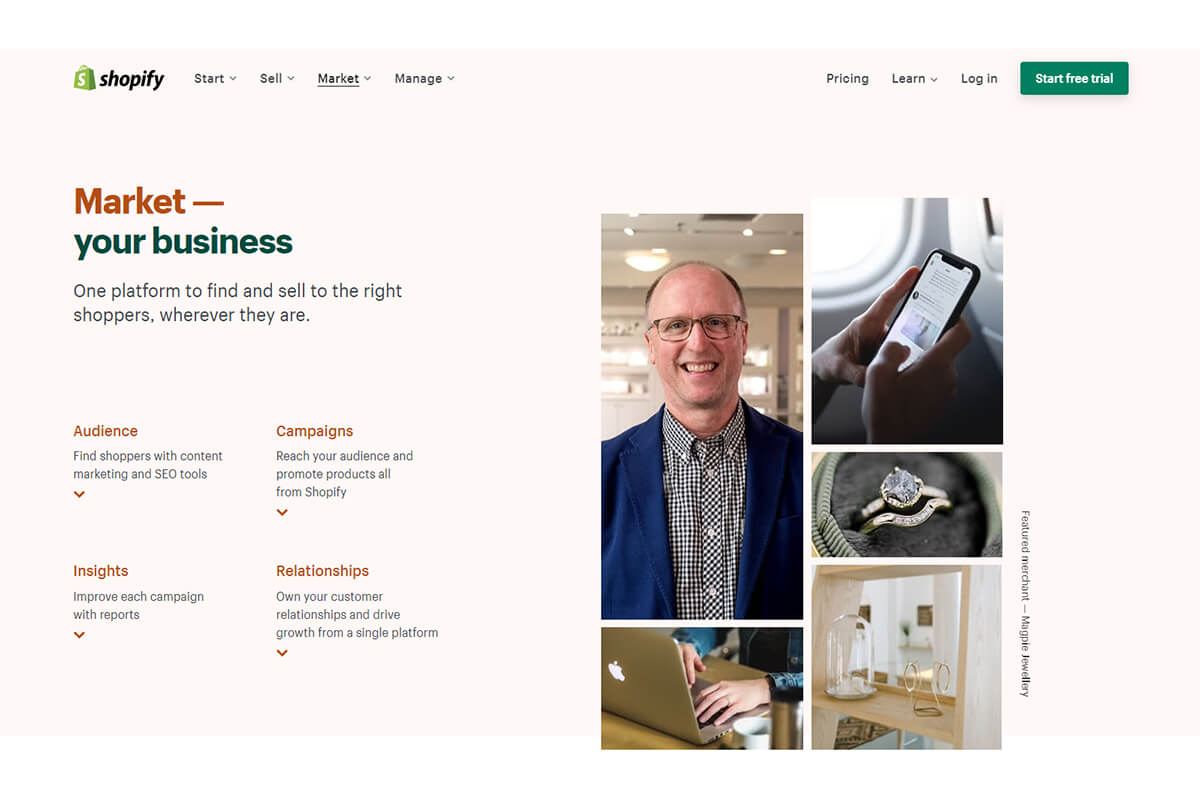
6 Best Marketing Strategies for Shopify to Increase Your Sales
Without further ado, here’s our list of the best Shopify Marketing ideas to market your Shopify store to increase online sales.
1. Content Marketing
One of the best marketing strategies these days is content marketing. It means getting to know what your target audience or potential clients want through data, keyword research, customer surveys, and other available means of gathering client information. Once you know what type of information and messaging your targets want, you can develop content that will reach your customers with content marketing. These can be helpful blog content, explainer videos, interesting vlogs, tutorials, user-generated content, and more.
A great feature of Shopify is the platform’s blog software. All Shopify users can add a blog to their website. This is a fantastic way to strategically promote your products and gain organic traffic. Don’t over-promote your products, though. Try to identify a problem that your product solves. Write a blog post about this problem, and offer your product as a solution.
Regular blogging has the potential to help your online store rank better on search engine results. And if your blog post ranks well, it can bring you a lot of traffic and customers over a long period of time. It’s a low-risk marketing strategy that doesn’t require much budget. Also, it’s a great opportunity to connect with your customers and help them fill out their knowledge gaps.

2. Social Media
When you ask, “how do I promote my Shopify store?” Many people will suggest using social media to help you reach people interested in your business.
Social media is one of the best ways to reach a large audience and grow your customer base. When it comes to social media in your marketing strategy, don’t just focus on pushing your products. Create engaging content that inspires your audience and builds a relationship with them.
There are many different strategies that you can use for social media marketing, including:
- Working with influencers in videos
- Posting your brand’s story
- Running hashtag challenges
- Creating helpful content for your niche
- Sharing company news
- Offering discounts

Social media platforms like Facebook, Instagram, Pinterest, Youtube, Twitter, and TikTok are gold mine for e-commerce businesses. These platforms offer advanced targeting to make your brand more visible to people from all over the world, making it possible to get more traffic and eventually better sales become achievable.
Some typical social media platforms for Shopify marketing are:
Scrolling down Facebook feed has become a part of our daily routine. 1.96 billion users worldwide browse their Facebook feeds every day. The good news is that you can leverage the immense power of Facebook’s reach to boost sales. It’s fairly easy to start marketing on Facebook as there is a dedicated feature that allows you to connect your Shopify account to Facebook. This way, your Facebook account will be linked directly to your Shopify store.
Another social media platform you can’t ignore is Instagram. This social media platform became widely used in 2012 and has been used by numerous business owners to create content for their businesses. Instagram has a few tools like reels, stories, posts, and live videos that you can use to promote your products. The higher the number of followers you get, the greater the possibility of boosting your Shopify store sales.
3. Advertising
Unfortunately, you can’t only rely on free website traffic if you want to make loads of sales. Blogging and social media takes time. Luckily, if you want fast traffic, there are some great paid advertising campaigns that let you reach a lot of customers and generate an excellent ROI.
This is often the first Shopify marketing strategy a store implements, as it gets your product in front of a lot of people very quickly. Google and Facebook are the best platforms to run advertising campaigns. Indeed, you can spend about $5/day on ads and get several daily sales with minimal effort.
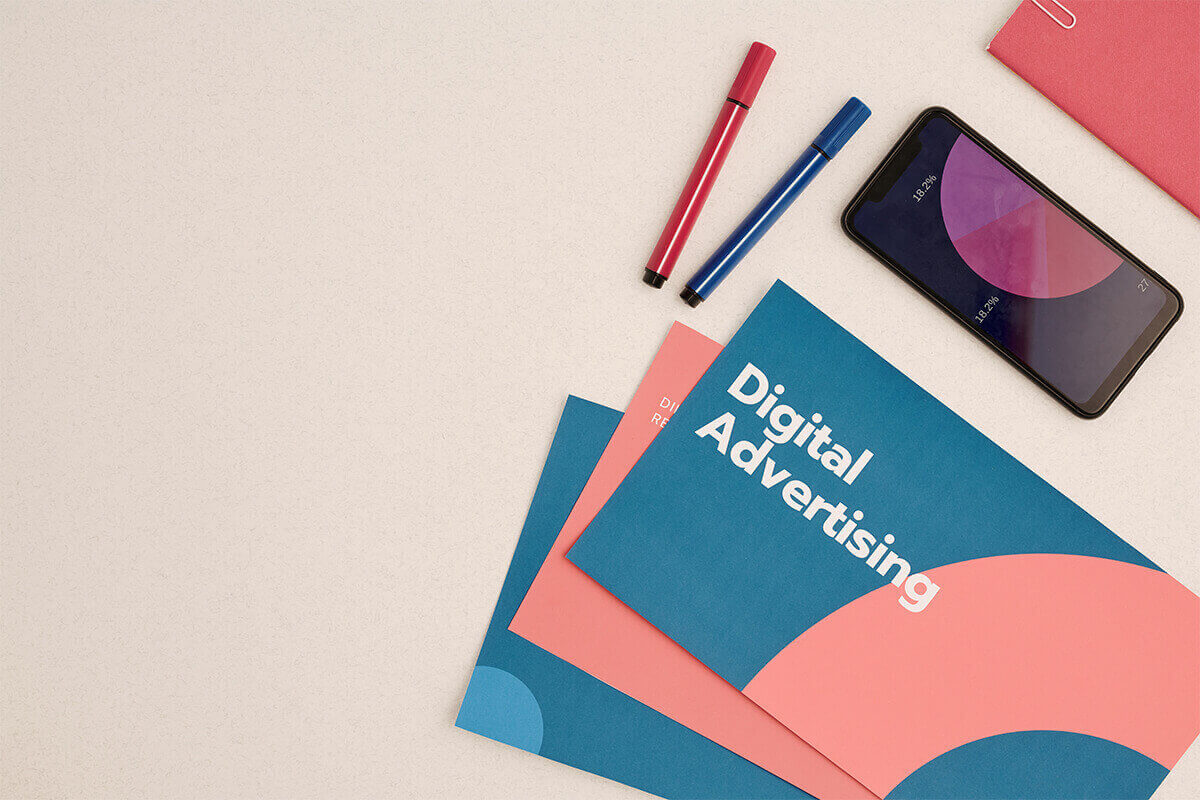
Some of the best-paid advertising strategies for Shopify stores include:
- Google shopping ads: With Google Shopping, Google determines when your product listing ads show up. They consider your feed, your site, and your bids to determine what search queries trigger your ads. This strategy is suitable for customers who like to do a lot of product research online.
- Facebook ads: Simple and effective, Facebook ads are great for impulse buys and especially for low-value products. Its algorithm lets you target a niche audience using location, age, and personal interests. This is the best way to get your product in front of your target customers.
- Google retargeting ads: If your store has some traffic, these ads are shown to people who have already visited your store and are interested in your products.
4. Email Campaigns
Email marketing is one of the most effective channels for encouraging more sales and improving customer retention. With this marketing strategy, you can promote products to new customers as well as forge relationships with the existing ones.
Email marketing enables you to send customized content to people you know are interested in your business. To start promoting your Shopify store via email, you need to have a subscriber list. Once you have a list of subscribers, you need to segment them into groups based on their interests.
You can send numerous types of emails to your subscribers, such as:
New product announcements
Newsletters
Blog posts, videos
Sales or promotions
Special offers
People are interested in your business for different reasons. So you need to ensure that your audience’s experience is personalized and send them the type of content relevant to their interests. When you have a direct connection with your audience, you can deliver valuable information to them and build trust.

5. Customer Loyalty Programs
A loyalty program is a strategy where customers are encouraged to come back more often and become repeat customers through points and rewards.
Creating a customer loyalty program is simple. Shopify has tools that you can use to create and implement loyalty programs. Loyalty, Rewards & Referrals by S Loyalty, for example, comes with a free plan and decent functionality. You can brand your loyalty program as rewards or user points and set up your desired parameters. When setting up your loyalty program, decide how to structure it. You can set up different tiers based on how much customers spend with better rewards for those in higher tiers.
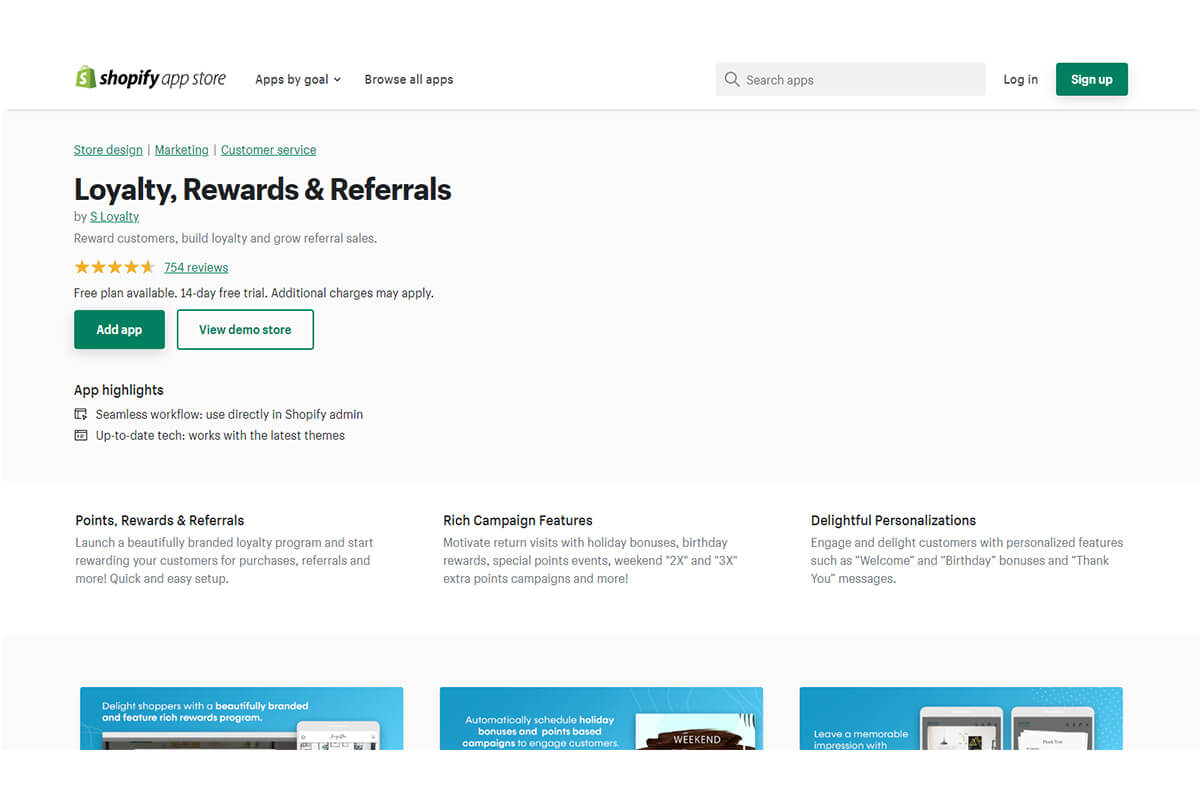
There are a lot of ways you can build this into your Shopify marketing strategy, such as:
- Adding a referral program so that customers earn a discount or free product every time they send a new customer to you.
- Allowing customers to earn points for every dollar they spend with you. Give them other chances to earn more points, such as following you on social media, liking and sharing your content, and signing up for your email marketing list.
- Offering rewards to your customers on their birthdays and anniversaries with your company.
6. SMS Marketing
One of the fastest-growing digital marketing strategies is SMS (Short Message Service) — also known as text messages. 54% of customers prefer SMS product promotions but only 11% of businesses send them. SMS marketing is totally underutilized, and it’s an incredibly powerful tool for Shopify store owners.
SMS has a few advantages over email for Shopify marketing. First, people open almost every SMS they get, which doesn’t happen with email. Second, SMS neither goes into spam folder nor gets rejected by an email provider. You can also use an SMS marketing app, so writing and sending out entire campaigns is easy and fast.
You can use SMS marketing for Shopify to:
- Send out promotional announcements like sales and discounts
- Send out transactional information, like order confirmations and shipping updates
- Deliver cart abandonment messages
- Target specific customers with personalized offers
- Promote your product giveaway

The Best Shopify Marketing App
The great thing about Shopify marketing is that there are literally hundreds of marketing apps available in the app store to help you promote your online store. This means you have loads of helpful apps that work alongside the platform to extend its marketing features and improve how you manage your business.
Here are some of the most beneficial marketing tools you can use to promote your Shopify store better.
1. SEO Booster
SEO Booster is an SEO app that offers you a comprehensive tool to find the best keywords. It covers all the main steps required to optimize your store for search engines. The app also identifies the site’s SEO issues and helps solve them. You might need these features to better optimize your website and make it rank higher on Google search pages in preparation for the busiest selling season. One of the best features is that it doesn’t require the users to have technical SEO knowledge. The app takes care of all optimizations, while also providing 24/7 customer support.
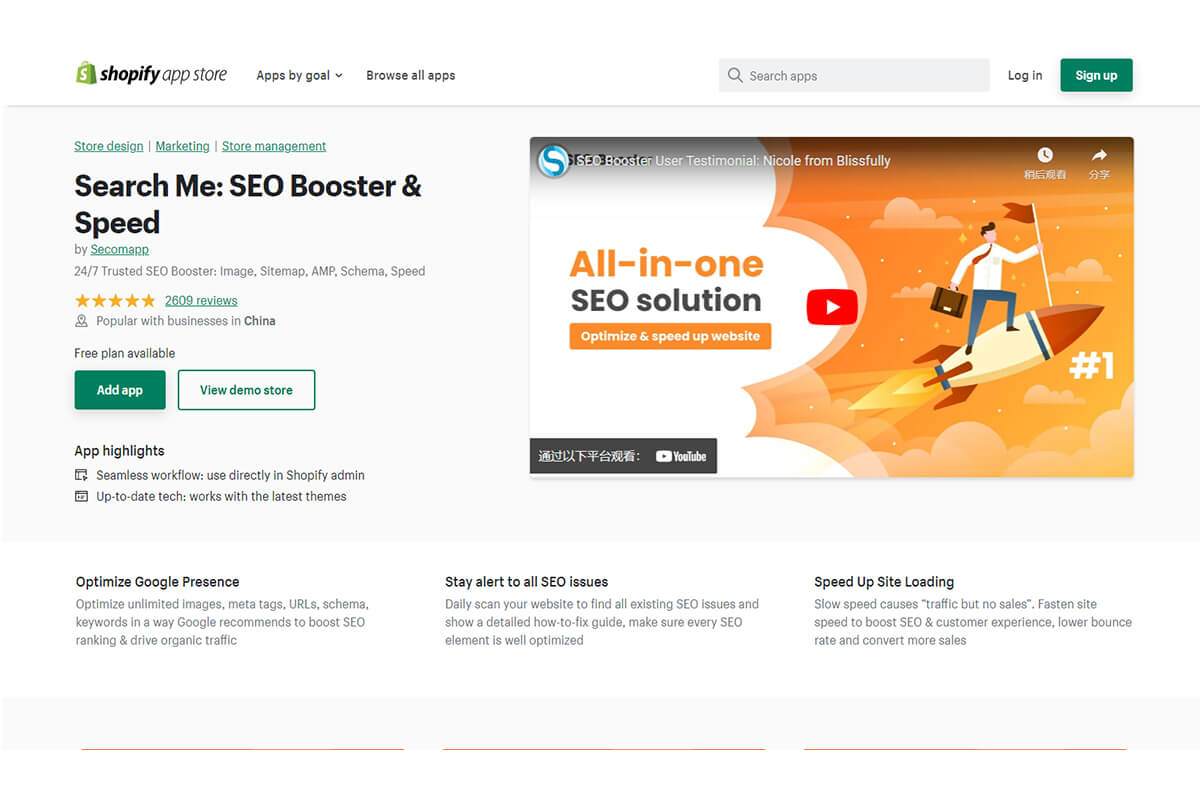
2. Google Channel
Aside from making it easy for merchants to create free listings on Google Shopping, Shopify’s Google Channel also allows sellers to run Smart Shopping campaigns. Through this app, you can reach a wider audience across various platforms like Gmail, Google Search, YouTube, and Google Display Network.
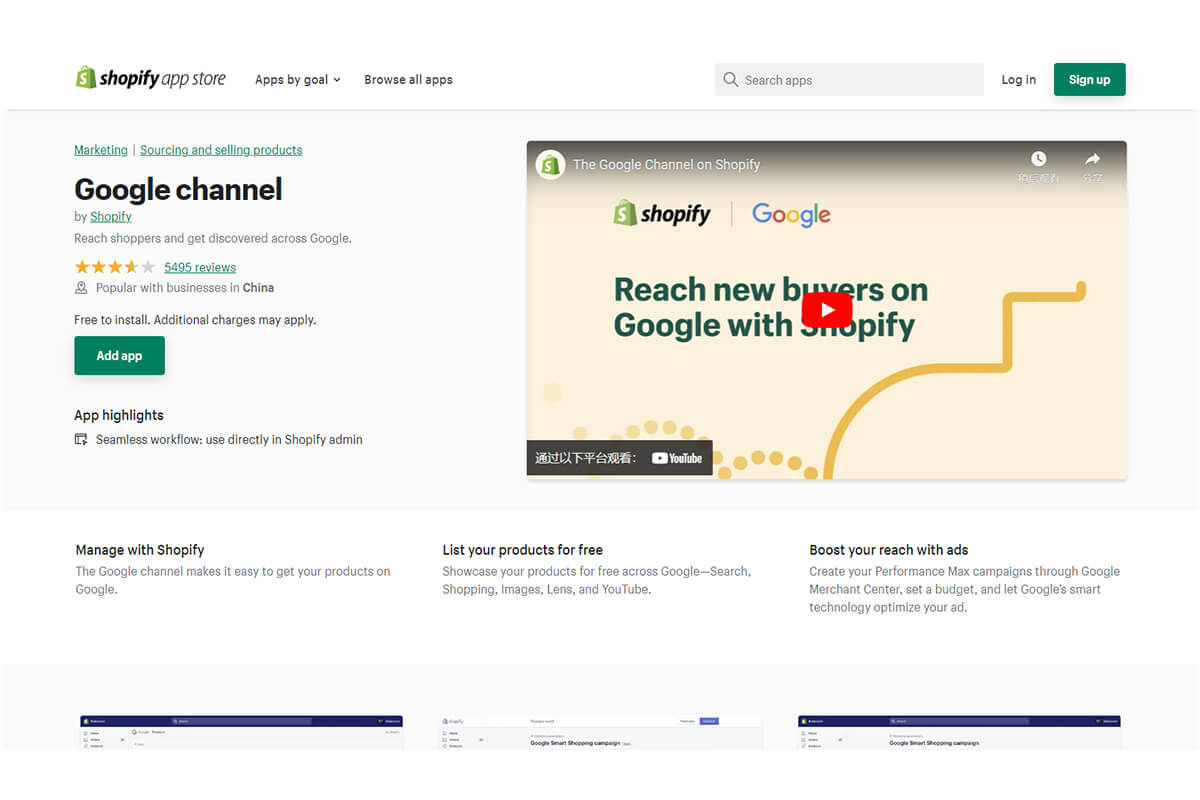
3. Instafeed
Instafeed enables Shopify stores to embed shoppable Instagram feeds right into their website. It is particularly useful if your target audience always uses Instagram or if your brand relies mostly on Instagram for social media marketing.
The connection between Shopify and Instagram goes both ways. You can add your Instagram feed to your Shopify store. This keeps your store content looking updated, grows your Instagram audience, and shows social proof on your Shopify store. You can also use Instafeed to create shoppable posts on Instagram. This can convert your Instagram audience into Shopify customers.
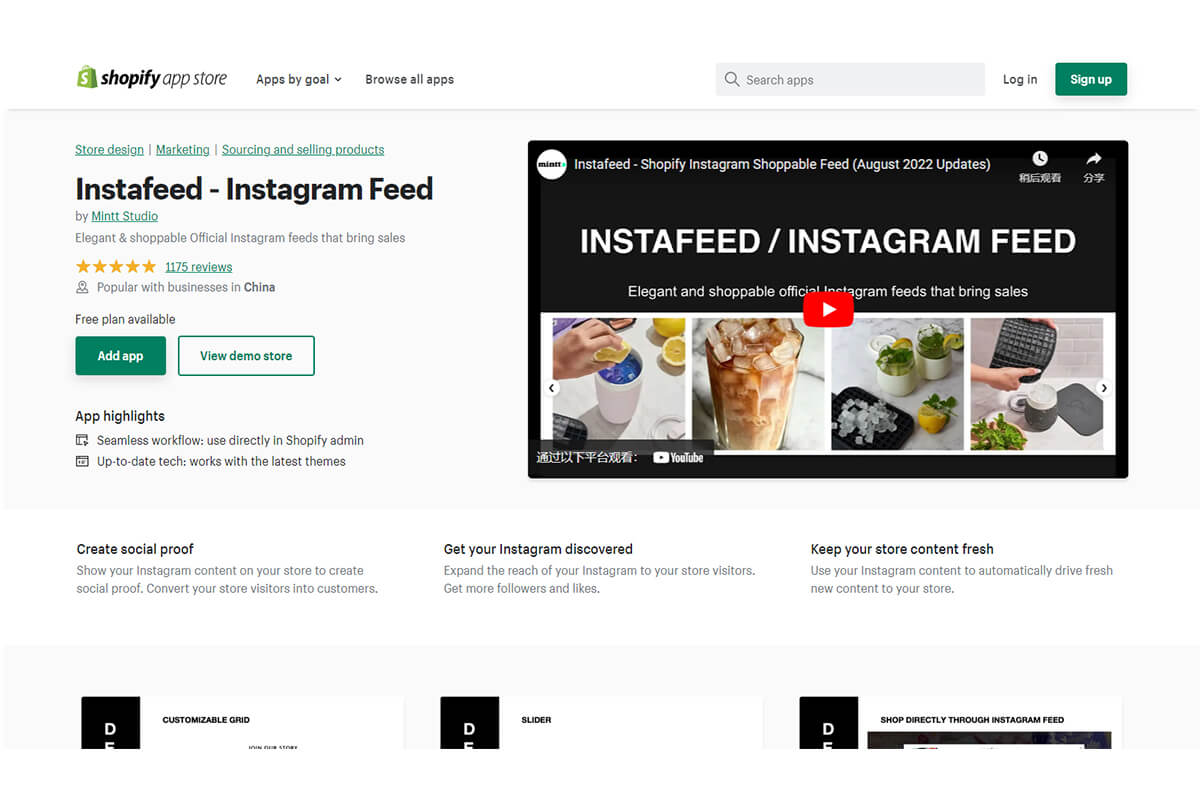
4. Omnisend
Omnisend is the best email marketing app for Shopify. When you add Omnisend to your store, you can collect emails from visitors, nurture leads with campaigns, and improve your sales and marketing. It helps you cover the entire process, from list-building, all the way to keeping your customers around so they keep on buying from you. You can also expand your communication to include SMS and push notifications.
This all-in-one marketing automation platform is chock-full of robust features that allow e-commerce marketers to create better relationships with their customers.
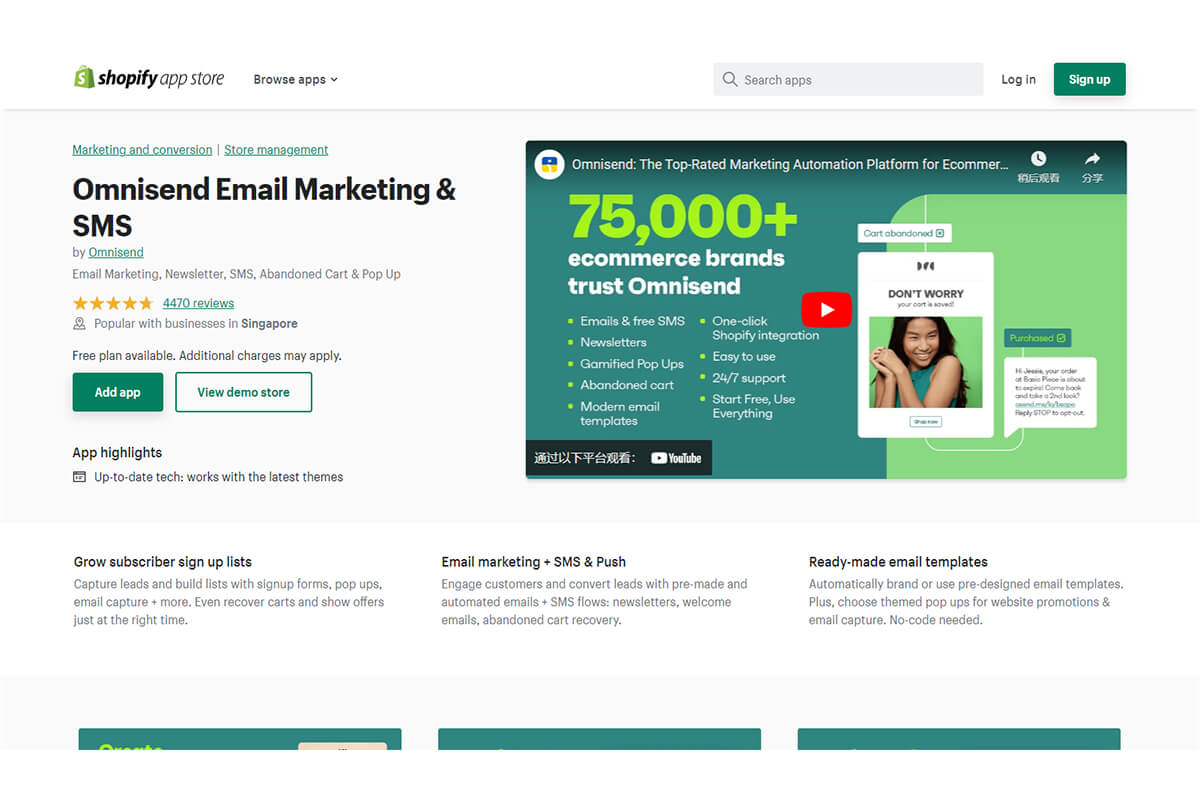
5. Adroll
Adroll is a great app for ad campaigns and remarketing campaigns. Since it facilitates campaigns that integrate ads and email, it is widely popular with existing Shopify merchants. Its network spans over 500 channels, including Google, Facebook, and Instagram.
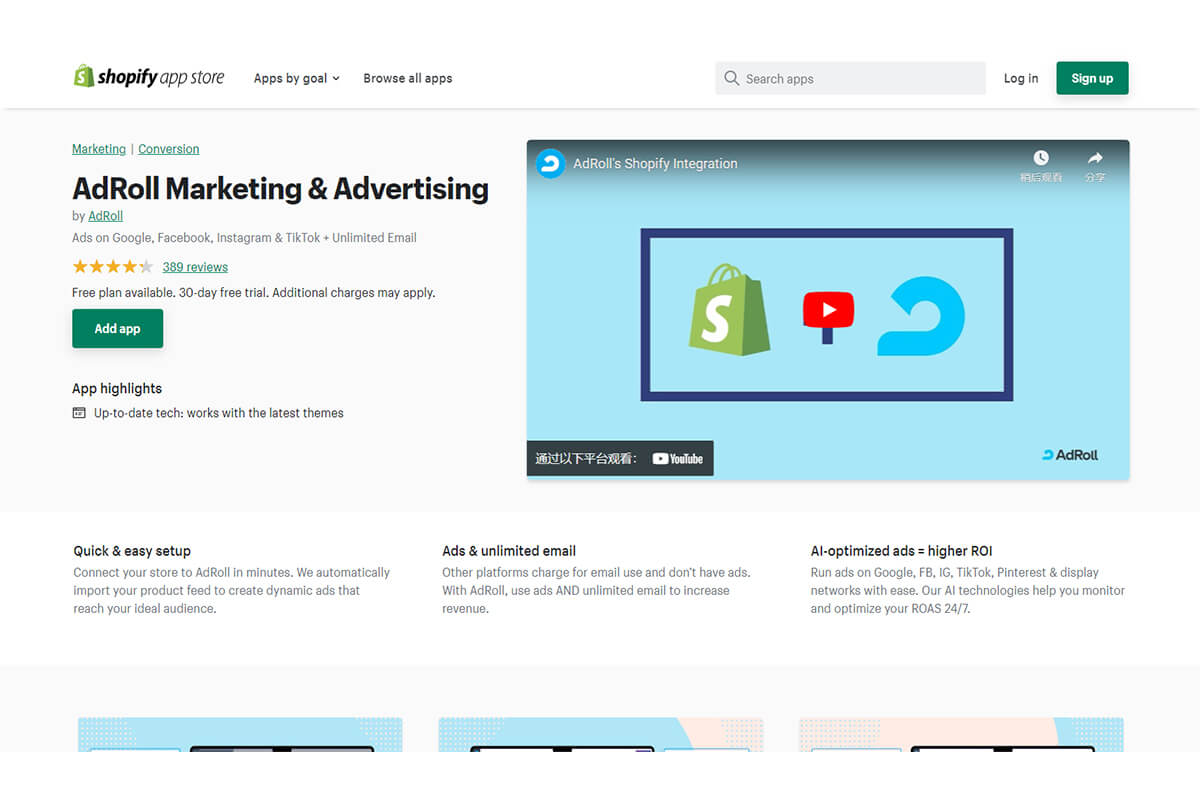
Which Shopify Marketing Strategy Is Best for You?
Now you have learned 6 Shopify marketing strategies. Which one should you choose?
Before you dive in and try them, know that every business has a unique audience and requires a unique marketing plan. Start by understanding your customers, knowing what their shopping habits are, and what they’re looking for in a brand like yours.
Put any of these Shopify marketing strategies to use and see which tools provide the best ROI to help you skyrocket your growth. Using a mix of these strategies is best. However, don’t try to do too much at once. Rather master a few marketing strategies than attempt them all without seeing results.

Conclusion
Shopify marketing is a process of promoting your store through content marketing, social media, advertising, customer loyalty program, SMS, email campaign, and other channels. Getting familiar with the marketing tools listed above should give you a good idea of where to start your promotional strategies. We hope that this post is helpful and to get more insight into the marketing strategy of Shopify.
What are some of your favorite Shopify marketing strategies or tools to grow your business? What has given you the most success? Let us know your suggestions in the comments.
About the Author

Jack Han
Jack is a SEO manager and blog writer at Sup Dropshipping. He holds an MA in Linguistics and Education. He has over 10 years experience in E-commerce, and 5 years of experience in SEO. Jack is an enthusiast to share his recent knowledge learnt from peer experts in the industry.
2 responses to “Shopify Marketing Strategies: Hotlist to Boost Your Sales”
-
Voglio aumentare il sito per favore
-
Ciao Yasinne,
puoi leggere di nuovo il nostro post e provare a utilizzare alcune delle strategie menzionate.
-

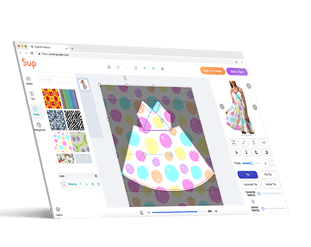


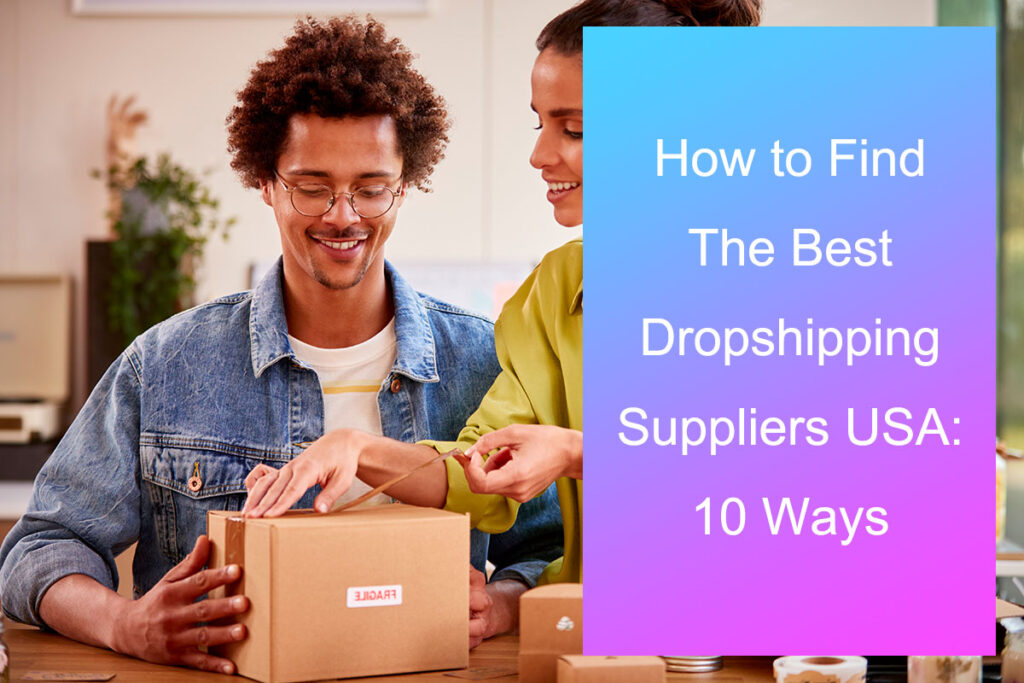
Leave a Reply